




 |
   |
 |
|
Dave Koz Kracked Earth Kraftwerk Kramer |
Kreis Volker Kriegel Dan Kristofferson Krokodil |
Ed Kuepper Kula Shaker Heinz Rudolf Kunze |
Michio Kurihara Kvazar Kyrie Eleison |
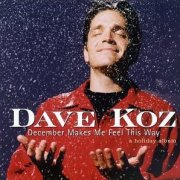 |
December Makes Me Feel This Way (1997, 47.35) **½/TT½ |
|
| Sleigh Ride Have Yourself a Merry Little Christmas Winter Wonderland White Christmas Santa Claus is Coming to Town The Christmas Song (Chestnuts Roasting on an Open Fire) I'll Be Home for Christmas Little Drummer Boy |
December Makes Me Feel This Way Silver Bells Eight Candles (a Song for Hanukkah) O Tannenbaum (O Christmas Tree) Auld Lang Syne |
|
Current availability:
Mellotron used:
Dave Koz is a saxophonist, although don't go to him looking for Charlie Parker comparisons. Saying that, he's far better than the horrible Kenny G, too, though I wouldn't go to his catalogue looking for anything especially interesting. Going by 1997's December Makes Me Feel This Way, Koz is in the mainstream entertainment business; he has also had radio and TV shows and I'm sure he knows his stuff. Looking at the track titles here tells you everything you need to know about this album; it's a Christmas record, with the obligatory American Chanukah/Hannukah song. Mostly instrumental, Koz emotes his way through familiar material, actually having a go at a jazz arrangement on Auld Lang Syne, just to show he can do it.
Phil Parlapiano plays Mellotron, although, strangely enough, only on the second half of the album. He kicks off with string and flute parts weaving their way through I'll Be Home For Christmas and the title track, with more strings on Little Drummer Boy and O Tannenbaum and flutes on Silver Bells. A surprising amount of Mellotron on a festive album that no sane person should even consider owning, then, although, knowing some of you, I wouldn't be surprised if a few of you are tempted by those five highlighted tracks... I can warn you off all I like; there's nothing I can do to stop you.
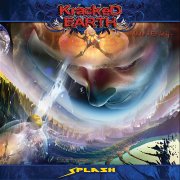 |
Splash (2012, 64.02) ***½/TTT |
|
| Heaven's Gate Can't Live Without You Strange Desire Coming Up for Air Into the Vortex Harvest Onwards Upwards Run Unconditional |
Footsteps in the Snow Never Walk Away Freakshow These Days The Promise Simple Man (2012 remix) |
|
Current availability:
Mellotron used:
Kracked Earth are, essentially, the duo of vocalist Tim Lynk and keys man Andy Kinch (Manasseh, 11.59 - hi, Andy), with major help from four others (notably Saxon guitarist Doug Scarratt), plus several guest spots, including Iona's Troy Donockley (once, briefly, a member of The Enid). Their debut, 2012's Splash, falls fairly and squarely into the 'melodic rock' category, a.k.a. AOR. Now, regular readers of this site will know that the genre is no favourite of mine, but I have to say, Kracked Earth do a vastly better job than many of their contemporaries, despite a heavy whiff of the '80s about much of the disc. Better tracks include the rocky Run, the ever-so-slightly Latin shuffle of Unconditional, the folky feel (Donockley's Uillean pipes to the fore) on The Promise and the vaguely Boston-like guitar solo on closer Simple Man, although some of the album is a little by-numbers.
Kinch plays his own M400 throughout, with string pads on every track except Can't Live Without You, 'Strawberry Fields' fields on Coming Up For Air, choirs (are those real, Andy?) on Into The Vortex Harvest and what sound like mandolins on Footsteps In The Snow. Highlights include the nice string swells in Run and the occasional upfront string part, but, if I have a complaint, the Mellotron is always somewhere at the back of the mix, providing supporting string pads rather than featuring as an instrument in its own right. Given that the bulk of this album neatly sidesteps my personal taste (because it, y'know, isn't actually aimed at me), I find myself unable to evaluate the larger part of its contents with any pretence at impartiality. However, AOR fans will absolutely lap this up, although Mellotron aficionados may, like me, wish that it were a little more upfront.
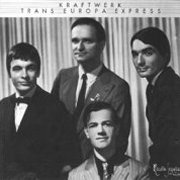 |
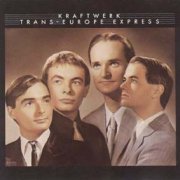 |
Trans Europa Express [a.k.a. Trans Europe Express] (1977, 42.46) ****½/TTEuropa Endlos (Europe Endless)Spiegelsaal (The Hall of Mirrors) Schaufensterpuppen (Showroom Dummies) Trans Europa Express (Trans Europe Express) Metall auf Metall Abzug (combined as Metal on Metal) Franz Schubert Endlos Endlos (Endless Endless) |
Current availability:
Mellotron used:
Kraftwerk's sixth album (under that name, anyway), continued the work of its two predecessors in its retro-futurism, combining state-of-the-art electronics with 1930s haircuts and suits, not to mention their ironic Brave New World lyrics (sample from previous album: "Radioactivity, it's in the air for you and me"). Actually, that's not how it went at all, originally; Kraftwerk's four albums after the seminal Autobahn (****) were all released in German- and English-language versions, creating some discographical confusion, not least with this release. Relatively few people outside Germany have heard the originals, but Showroom Dummies sounds so much more, well, sinister as Schaufensterpuppen, doesn't it? Maybe you'll just have to take my word for it.
Trans Europa/Europe Express is an absolute classic, far more 'progressive' than you might expect, particularly nine-minute opener Europa Endlos and the title track suite, occupying most of side two. Incidentally, the German version lists eight tracks, while there are only seven on the English; Metal On Metal comprises both Metall Auf Metall and Abzug, essentially a reprise of the title track. There's a shedload of humour to be found within the grooves, especially on Schaufensterpuppen, which, when heard in English, is utterly deadpan, though not quite as much as The Model from the following year's Die Mensch Machine (The Man Machine) (****½). The band had been making heavy use of the Orchestron, a 'pro' version of Mattel's Optigan, since Autobahn and most of the strings and choir here are from that, but the various parts of Trans Europa Express feature a reiterating Mellotron string melody, sounding noticeably different from the rising Orchestron string line.
So; a classic, helping to unleash a new, ultra-modern sound into the world, for better or worse. Highly amusingly, early-'80s New York rap star Afrika Bambaataa, who remixed Trans Europe Express, initially refused to believe they weren't black; I mean, how much more whiter-than-white Teutonic do you want, FFS?
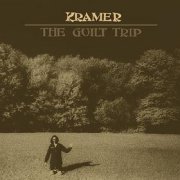 |
The Guilt Trip (1993, 127.34) ***/T½ |
|||
| Overture Stupid Summer Got What I Deserved Wish I Were in Heaven Not Guilty Wisdom Sits Stubb's Hallucination The Drowning Heart Welcome Home |
Swallow Up Jonah Hello Music The Murder of God You Don't Know The Wall of Sleep The Guilt Trip Wait for the Hate Natasha Disappears Big of You |
My Friend Daniel The Maximus Poems The Seven Seizures Thank You Music Kathleen, I'm Sorry God Will See You I'm Your Fan The Bosom Friend I Love You |
Next Time, Try Compassion Charlotte's Brain Mudd Hutt Four The Well Hung Jury Won't Get Far Without Me Ball Five She Won't Let Go I've Seen The End Coda |
|
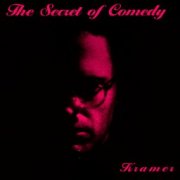 |
The Secret of Comedy (1994, 52.29) ***/TT |
|
| Nine Minus Seven is Two The Secret of Suicide Midnight Stingst The Secret of Philosophy I Can Watch Who Are You Today? My Rock'n'Roll |
The Secret of the Band Sounds Like? Wishing Well Second Coda |
|
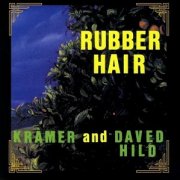 |
Rubber Hair [as Kramer & Daved Hild] (1996, 41.49) ***/T |
|
| Photograph The Cat in the Window Masonic Hardware The Veronica Building Bargains Night Bargains Cold Air Vegetables Do Mr Ryder on the Beach |
X is the Sign Distress in the Dixie Girls The Ballad of Veal Rubber Hair |
|
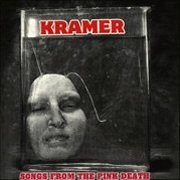 |
Songs From the Pink Death (1998, 47.10) ***/T |
|
| The Funny Scene Buddy Holly Will Never Die The Opium Wars Have Long Ceased Don't Come Around The Parasite Song The Pink Death Song of Love It Never Stops Being Absurd Eddie Called Back on the Carphone |
You've Got to Hide Your Love Away The Hot Dog Song It's Alright if She Don't Love You Right |
|
Current availability:
Mellotrons used:
(Mark) Kramer is a renowned NYC-based producer/musician/studio and label owner whose production work and side-projects are legendary amongst fans of low-fi US noise/indie crossover stuff. After playing for Shockabilly, The Butthole Surfers, Bongwater and others, Kramer opened his Noise New York studio in the mid-'80s, using it for his own multifarious projects alongside his commercial work (I use the term loosely), including Galaxie 500, Low and White Zombie. 1993's sprawling double-disc The Guilt Trip was the first album released under his own name, although Who's Afraid?, his collaboration with Gong's Daevid Allen, appeared the same year. It's a bewildering mix of styles, encompassing psychedelia, low-fi, post-rock, drone-rock and probably several dozen other sub-genres of the strange, not to mention the good old guitar wig-out hard rock of Mudd Hutt Four and Ball Five. Hugely ambitious, it's almost true to say there's something here for everyone, or at least, everyone who loves alternative rock from the '60s to the '90s. Kramer plays obviously real Mellotron on three definite tracks, with strings on Overture, You Don't Know and the title track; it could be hidden away elsewhere, but it doesn't seem that likely.
The following year's The Secret of Comedy might just be Kramer's best album, at least of the ones reviewed here, more appealing tracks include Midnight, I Can Watch, with its heart-rending lyrics and the rather rude Wishing Well, a Je T'Aime for the modern era? Kramer on Mellotron again, with wavery strings on The Secret Of Suicide and The Secret Of The Band, melodic flute and string parts on I Can Watch and echoey flutes on closer Second Coda. '96's Rubber Hair was a collaboration with Daved Hild (they both played with Ralph Carney in Carney•Hild•Kramer, too), so I'm not entirely sure I should be filing it under Kramer's solo work. Whatever. Anyway, it's more song-based than much of Kramer's work, possibly at its best on opener Photograph, the epic Cold Air and Mr Ryder on the Beach. One Kramer Mellotron track, with skronky strings and flutes on The Cat In The Window. 1998's more sensibly-lengthed Songs From the Pink Death takes Kramer's psych sensibilities and hones them into an under-fifty minute resumé of his take on the style, shucking off the experimentation of The Guilt Trip. It's certainly an easier listen, if only because it's so much shorter, but expunging the longer effort's flights of fancy leaves the album a little more predictable, at least by Kramer's standards. He plays Mellotron again, with wonky flutes on opener The Funny Scene and nothing else obvious, unless that's background flutes on The Hot Dog Song.
See: Daevid Allen & Kramer | Dot Allison | The Captain Howdy | Carney•Hild•Kramer | Damon & Naomi | Dogbowl | Jacques Duvall | Hugh Hopper & Kramer | King Missile | Little Aida | Low | Mecca Normal | Raymond Listen | Sr. Chinarro
Lenny Kravitz (US) see: |
 |
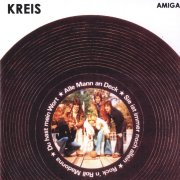 |
Alle Mann an Deck (1978, 37.54) **/½ |
|
| Sie ist Immer Noch Allein Ich Will ihr Mann Sein Du Hast Mein Wort Gib Dich Nie Auf Alle Mann an Deck Fremder Mann Rock'n'Roll Madonna Ich War der 5. Beatle |
Wir Spielten Mann und Frau Nachtvogel, Flieg |
|
Current availability:
Mellotron used:
Kreis' second album, 1978's Alle Mann an Deck, is quite typically East German (as was) in that it tries (and, of course, fails) to be all things to all men; I don't blame the band, just the horrible system they lived under, where 'equality' seemed to be a synonym for 'equally shit'. Stylistically, it shifts between the admittedly halfway decent folk/pop of opener Sie Ist Immer Noch Allein and the less-decent title track through the female-vocalled prog/pop (no, really) of Du Hast Mein Wort to the horrible sub-disco of Ich Will Ihr Mann Sein, Gib Dich Nie Auf and (especially) Fremder Mann. To be honest, I'm really struggling to say anything nice about this crummy effort, but its nonsensical mix of styles has defeated me.
Bassist Helmut Sickel is credited with organ and Mellotron, but, since pretty much all of the strings sound real, as does the slow flute part on closer Nachtvogel, Flieg is eventually revealed to be genuine, the only place I think it even might be is a few string chords on Sie Ist Immer Noch Allein. This is available (ahem) as a download, but I really can't recommend it in any way whatsoever, particularly with next to no audible Mellotron. Rubbish.
 |
Topical Harvest (1976, 39.50) ***/½ |
|
| Hypnotic Pignose Circus Gambet Hallo Albert Remember Gereba Sister Matic Oriente Bahia Next Year Tribut |
Let's Say Windmill Saturnalia |
|
Current availability:
Mellotron used:
German jazz guitarist Volker Kriegel (1943-2003) was one of West German fusion's leading figures, playing on dozens of albums over his career and collaborating with many of his peers, not least Passport's Klaus Doldinger. Topical Harvest, from 1976 (some sources say '75), is a pleasingly melodic fusion album, certainly in comparison to many of its contemporaries, mostly lacking the fiery instrumental interplay of many American outfits, although opener Hypnotic Pignose features some ripping Rhodes work.
Bassist Hans Peter Ströer doubles on Mellotron on two tracks, with background strings on Hallo Albert and Let's Say Windmill (almost inaudible on the former), although there's nothing audible on the credited Circus Gambet. A mistake? If you're looking for something to sit next to your Mahavishnu Orchestra collection, Volker Kriegel probably isn't your man, but if you prefer tasteful, tuneful fusion, you could do a lot worse than this.
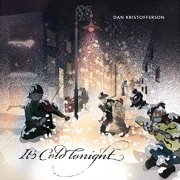 |
It's Cold Tonight (2009, 41.30) ****/TT |
|
| These Times Disgrace To See His Love Again I Believe Golden Dreams Waiting Just for You In Loving Memory A Cure |
I'll Start Again It's Cold Tonight |
|
Current availability:
Mellotron used:
I haven't heard Dan Kristofferson's 2006 EP, I'll Start Again (Mellotron played by our old friend Lars Fredrik Frøislie), but 2009's It's Cold Tonight is a dark, downbeat effort, in the best possible way, Kristofferson's careworn voice imbuing his songs with a particular gravitas. Highlights include opener These Times, I Believe, the intense A Cure and the gentle, violin-led closing title track, but nothing here could be omitted without diminishing the overall effect.
Three Mellotron players are credited, Kristofferson, Håkon Møller and Kai Christoffersen, with polyphonic flutes on To See His Love Again, vibes and strings on Waiting Just For You and strings towards the end of I'll Start Again, presumably re-recorded from the EP. I look forward to hearing Kristofferson's earlier release, but for now, this will do. Worth hearing.
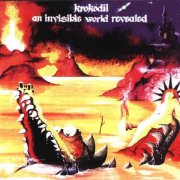 |
An Invisible World Revealed (1971, 43.43) ***½/TTT½Lady of AttractionWith Little Miss Trimmings Odyssey in Om Green Fly Looking at Time Last Doors |
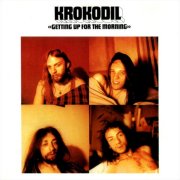 |
Getting Up for the Morning (1972, 40.06) ***½/TMarzipanAnd I Know Rabatz Was There a Time Schooldays Song No. 2 (Thoughts Under Bad Conditions) The 12th of March |
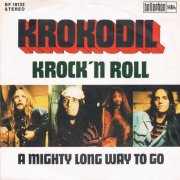 |
7" (1972) ***/½ Krock'n Roll A Mighty Long Way to Go |
Current availability:
Mellotrons used:
Krokodil's third album, 1971's An Invisible World Revealed, is reputedly their only progressive effort and probably the only one worth hearing. You can tell that they're coming from a folk background, to which they've added some wigged-out psych, although some of the material slightly outstays its welcome, if I'm going to be honest. The overall vibe is pretty good, though, the folk stuff colliding head-on with some dark, distorted guitar work straight out of the Edgar Broughton Band songbook. As for Terry Stevens' Mellotron (the then-new Dierks' Studio M400), Lady Of Attraction has a few brass chords, plus a quick burst of strings, with more upfront strings on Green Fly. The druggy Odyssey In Om is the album's Mellotron highlight, though, a rich, almost unaccompanied Mellotron strings part backing some stoned-out narration, in the obligatory German accent. More of the same later in the song, this time underpinned by flutes, with a strings melody tagged on, making for a very worthwhile Mellotron effort.
The following year's Getting Up for the Morning is probably a little less proggy, being more of a psych-into-slightly-hard-rock effort, typified by the CSN&Y-alike And I Know and the rambling Song No. 2 (Thoughts Under Bad Conditions). It's probably at its best on bluesy opener Marzipan, Rabatz and driving, jammed-out closer The 12th Of March, although don't go expecting a repeat of its predecessor. Stevens on Dierks' Mellotron again, with strings on And I Know and a brief polyphonic flute part at the end of Song No. 2. The same year's Krock'n Roll c/w A Mighty Long Way to Go is (unsurprisingly) a rock'n'roll effort backed with a folky singalong, the flip featuring early-use Mellotron choirs, presumably from Stevens again. Incidentally, despite Mellotron credits on recent recordings from the reformed band, it's most unlikely to be genuine.
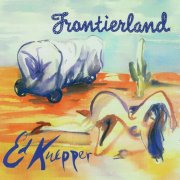 |
Frontierland (1996, 40.31) ***/T½All of These ThingsFireman Joe The Weepin' Willow How Would You Plead? M.D.D.P. Limited Pushin' Fear II Rough Neck Blues Someone Told Me Poor Howard |
Current availability:
Mellotron used:
Back in the mid-'70s, Ed Kuepper was one of the founding members of Brisbane's greatest export, The Saints, leaving the band in 1978; since then, he's operated under a variety of band names, has rejoined The Saints on various occasions and even worked with Nick Cave. 1996's Frontierland is something like his thirteenth solo album, excluding his work with The Laughing Clowns, The Aints (ho ho) and other outfits. Stylistically, the album's all over the place, from the Appalachian folk-influenced Fireman Joe through the synth/brass-driven The Weepin' Willow, seemingly aimed at the dancefloor, while incorporating elements of singer-songwriterness and, er, Hawkwind, the low-fi acoustic Rough Neck Blues, the '60s-influenced organ and brass-heavy Someone Told Me... Variety's fine, but the end result lacks cohesion, sounding more like a various artists compilation than a band album.
Charlie Cole plays clearly very real Mellotron; All Of These Things is absolutely stuffed with the thing, strings, flute and a repeating low cello (actually double bass) note sparring with each for supremacy in the mix, with more strings on How Would You Plead?, although the strings on M.D.D.P. Limited seem to be real. Overall, then, not bad, but could hang together slightly better, with one classic Mellotron track in All Of These Things.
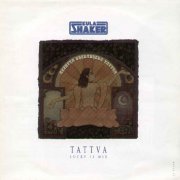 |
7"/CDS (1995) ***½/T Tattva (Lucky 13 Mix) Hollow Man (Part II) |
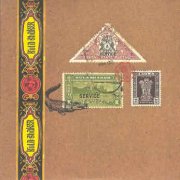 |
Tattva [Disc 1] (1996, 14.19) ***½/TTTTattvaDance in Your Shadow Moonshine Tattva (Lucky 13 Mix) |
 |
Hey Dude [Disc 2] (1996, 15.41) ***½/THey DudeTattva (BBC session) Drop in the Sea Crispian Reading From the Mahabharata |
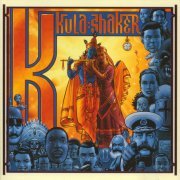 |
K (1996, 61.35) ****/TTT |
|||
| Hey Dude Knight on the Town Temple of Everlasting Light Govinda Smart Dogs Magic Theatre Into the Deep Sleeping Jiva Tattva Grateful When You're Dead/ Jerry Was There |
303 Start All Over Hollow Man Part 1 Part 2 [K-15 ed. adds: Tattva (Lucky 13 Mix) Into The Deep (unreleased version) Red Balloon Hush Everybody's Turning to Stone (demo) |
Shower Your Love Slipping Away Magic Theater (demo) Moonshine (demo) If We Were One (demo) Hey Dude (live) Knight on the Town (live) Under the Hammer (live) 303 (live) Grateful When You're Dead (live) Jerry Was There (live) |
Tattva (live) Hollow Man (live) Gokula (live) Hush (live) Govinda (live) Smart Dogs (live)] |
|
Current availability:
Mellotrons used:
Kula Shaker burst onto the UK scene in 1995, heralding a wave of late-'60s influenced bands without Oasis' terminal plagiarism problem. As the son of actress Hayley Mills, singer/guitarist/chief writer Crispian Mills was never going to be short of a bob or two, which instantly rose hackles with the notorious snobbery-reversal of the British music press, as did his rather unwise comments concerning the religious use of the swastika (perfectly true; the Nazis reversed an ancient Hindu symbol. Just don't say so in interviews).
For some reason, their debut single was a different version of Tattva to the one that ended up on the album, the 'Lucky 13 Mix', although Jay Darlington's Mellotron (or Mellow-Tron) parts are similar. The 'regular' Tattva CD single adds the alternate version, also featuring Dance In Your Shadow and Moonshine, both loaded with Mellotron strings. In fairness, you can see why neither track made the album, though they're both perfectly good, but Dance In Your Shadow rips Norwegian Wood fairly heavily and Moonshine just doesn't have quite enough of 'it', whatever you take 'it' to be. The second disc of the Hey Dude CD single (remember that particular scam?) adds a BBC session version of Tattva, Darlington playing what sounds like real Mellotron strings, although the flute part is absent.
When it finally appeared, K was a glorious technicolour blast of an album; vibrant, uplifting pop/rock with some great keyboards (not a synth in sight). The album's best track (and major hit), opener Hey Dude doesn't feature any Mellotron, but the three tracks that do are all worthy of attention, especially lesser hit Tattva, with some great overdubbed flutes and strings and a superbly creaky pitch-bend at the end (can't fake that effect!). The album's only real letdown is that they didn't use the Mellotron more; several other tracks would probably have benefitted from its use. Saying that, it's easy to reach 'Mellotron overload'; maybe they were right to hold back a bit. 2011's massively-expanded K-15 two-disc edition comes in two versions, irritatingly, the Japanese release, including all those hard-to-find b-sides and the UK one, which loses most of the b-sides, but adds an entire gig from Bath Moles. Both versions include an unreleased single, Slipping Away and one of 'Mum's Living Room Demos', If We Were One, background Mellotron strings present and correct on both, plus flutes on another of those demos, Magic Theatre.
Their version of Deep Purple's version of Joe South's Hush has a live version of Govinda on it and, to my surprise, you can hear Mellotron strings quite clearly on it, although it seems they're samples (reviewed here). There are loads of other single-only tracks from their first album period; album outtakes, live, radio session versions and remixes, although that would seem to be it on the Mellotron front. Kula Shaker released one more album before imploding, '99s Peasants, Pigs & Astronauts (**½), but it isn't a patch on their debut and, what's worse, they don't use the Mellotron. Avoid. To my knowledge (note that caveat), this is the entirety of Kula Shaker's Mellotron use, which isn't to say that either a) I've missed something, or b) other relevant tracks will appear at some point in the indefinite future, although, after K-15, you'd have thought that pretty much everything that's ever going to be released now has.
See: Samples etc.
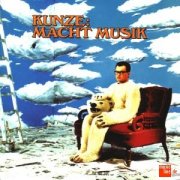 |
Kunze: Macht Musik (1994, 56.07) **½/T½ |
|
| Was Willst Du Sex Mit Hitler Leg Nicht Auf Fetter Alter Hippie Eigentlich Nein Keine Umkehr Mehr Einfacher Mann Freier Fall |
Du Gehörst Zu Jemand Andrem Hereinspaziert Der Mann der Zu Atmen Vergass Goethes Banjo Tohuwabohu |
|
Current availability:
Mellotron used:
Heinz Rudolf Kunze is one of those artists who mean zilch outside their home market, often because they (quite rightly) sing in their native language. Kunze might have become known in the English-speaking world had he sung in translation, but with a potential German-language audience topping ninety million over three countries, why bother? Better to be a big fish, maybe... Born in the mid-'50s, he released his first album in 1981, keeping up a consistent workload ever since, 1994's Kunze: Macht Musik being something like his thirteenth album, although I don't know how many of its predecessors might be compilations or live. To be honest, it's a pretty average '90s German-language pop/rock effort, the only track that stands out in any way being the brooding Goethes Banjo, the rest of the overlong album drifting past this listener without making any real impression.
Thomas Bauer plays Mellotron, with background strings on Keine Umkehr Mehr and Freier Fall (with its Rush-like guitar part) and a more upfront part on Goethes Banjo. It might be on a couple of other tracks, but you know how it is...
See: Samples etc.
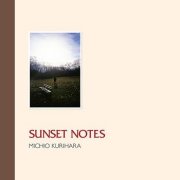 |
Sunset Notes (2005, 42.29) ***/T½Time to GoDo Deep-Sea Fish Dream of Electric Moles? Wind Waltzes Pendulum on a G-String ~The Last Cicada Cannon in "C" (C is for Cicada) Twilight Mystery of a Russian Cowboy The Wind's Twelve Quarters The Old Man and the Evening Star A Boat of Courage |
Current availability:
Mellotron used:
Michio Kurihara (Ghost, White Heaven) is a Tokyo-based psychedelic guitarist, who released his first solo album, Sunset Notes, in 2005. Influences include various progressive and psych outfits, but to my ears, it's chiefly a post-rock album, although opener Time To Go is almost indie, with a similar guitar-heaviness to several other tracks, while the mad 'spaghetti eastern' of Twilight Mystery Of A Russian Cowboy translates that surf/Morricone thing into the Japanese idiom.
Two obvious Mellotron tracks, with a nice string part from Soichiro Nakamura on Do Deep-Sea Fish Dream Of Electric Moles? (ho ho) and some very upfront strings towards the end of The Wind's Twelve Quarters from Kurihara. Overall then, slightly disappointing, given Kurihara's history, although it has its moments, not least the Mellotronic ones.
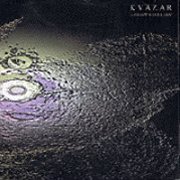 |
A Giant's Lullaby (2005, 64.27) ****/TTT |
|
| Flight of Shamash Chair of Life Black Hole I Dreams of Butterflies Black Hole II Spirit of Time Desert Blues Sometimes |
A Giant's Lullaby Dark Horizons |
|
Current availability:
Mellotron used:
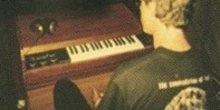 |
Kvazar are a prog act who've been around since the late '90s, although 2005's A Giant's Lullaby is only their second album (the problems of truly independent music, folks). While clearly (and admittedly) influenced by the Swedish '90s wave (you know, Änglagård et al.), they also throw in all kinds of other stuff, including Celtic folk (opener Flight Of Shamash), jazz (several tracks) and a near-ambient feel in a few places. If the album has a fault, it might be fair to say it's a little overlong; music this intense and varied usually comes better in small packages, but that's looking for something to complain about, to be honest.
Mellotron (an EMI M400, going by the pic on the right, although I've no idea whether it's a studio machine or the band own it) from Anders Jensen Deaya and Ronny Johansen, with strings and choir on Chair Of Life and Dreams Of Butterflies, strings on Spirit Of Time and Sometimes and choirs on the title track, never overused, always tasteful. Thank you, Kvazar. This is a surprisingly original album in a genre riddled with third-rate copyists (and they're the good ones), well worth your time and money, with a reasonable amount of Mellotron to boot. Most worthwhile.
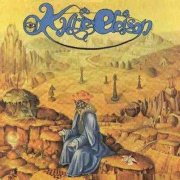 |
The Fountain Beyond the Sunrise (1977, 49.32/60.43) ***/TTT½Out of DimensionThe Fountain Beyond the Sunrise Reign Voices The Last Reign Autumn Song Forgotten Words Lenny [CD adds: Mounting the Eternal Spiral] |
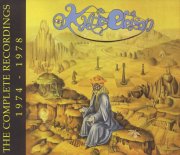 |
Live 1975 (2002, 64.13) ***/TTT½A Pane of GlassGlass People Keyboards improvisations Out of Dimension Get Ready Eddy |
Current availability:
Mellotrons used:
Despite actually being Austrian, Kyrie Eleison were a fairly typical German mid-'70s prog outfit, with a sound not dissimilar to Grobschnitt, maybe, if far less accomplished. Their first recordings, The Blind Windows Suite (**), were finally made available in the mid-'90s and are, frankly, hopeless. It's not so much the rehearsal room-quality sound (which was, in fact, where it was recorded), but the complete dearth of decent musical ideas that scuppers the record, along with Wolfgang Wessely's quite awful vocals. There's really no point laying into the record, but I honestly wouldn't bother unless you're an utterly fanatical prog collector.
Their one album released in their lifetime, The Fountain Beyond the Sunrise, was a considerable improvement on their earlier effort, although it's not going to win any awards for originality. New vocalist Michael Schubert was only a slight improvement on his predecessor, with some extremely dodgy English pronunciation, but the standard of playing and composition was up all round. Keyboard player, main man and chief writer Gerald Krampl plays Mellotron on most tracks, although he sensibly doesn't overuse it, making it all the more effective when he does. Strings, with occasional flutes and cellos are the order of the day, played with a Tony Banks feel in places (Lenny), with admirable restraint. The bonus track, Mounting The Eternal Spiral, only has a few string chords and is probably the expanded album's weakest track, or maybe it just seems that way after an hour.
In 2002, a three-CD set was released by the estimable MIO Records (RIP), Complete Recordings, 1974-1978, containing both the above albums and a previously-unheard live recording from 1975, er, Live 1975. I was expecting this to be as dodgy as their first recordings, but the band had obviously pulled their socks up in a serious way in the intervening few months and the material's actually not at all bad. I was also surprised that Krampl had bought his Mellotron by this point, which spices the material up nicely. Near-thirty minute opener A Pane Of Glass is possibly the album's best track, but all except the clearly ELP-inspired Get Ready Eddy, a studio demo stuck on the end, are worth hearing.
The easiest way to get any of Kyrie Eleison's material is to buy the three-disc set, but I'm not sure if the overall quality is high enough to make it really worth the effort. There's certainly some nice Mellotron work to be heard on two of the three discs, but much of the songwriting falls into the 'make it as long as possible 'cos it's prog' trap, although there are quite a few nice ideas scattered across discs two and three. More Ts than *s, I think. Incidentally, Krampl and bassist Norbert Morin went on to form Indigo.
See: Indigo